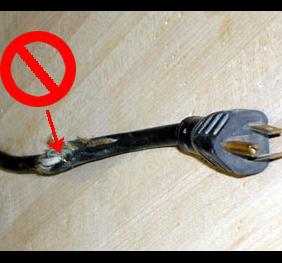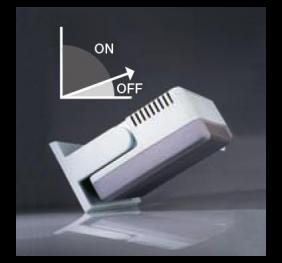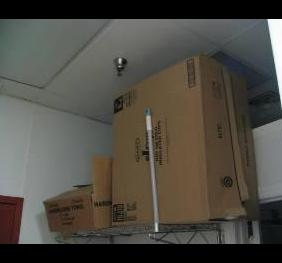


Contrary to popular belief, every workplace and living space has potential hazards, and many hazards are caused by very ordinary items commonly found in most offices and residential spaces. For example, did you know that damaged wires, plugs, and improperly used extension cords resulted in 6,900 fires and $115.9 million in direct property damage between 1994 and 1998? (Source: National Fire Protection Association)
The following is a selection of some of the common hazards frequently found during health and safety inspections. Avoiding these potential problems in the workplace helps ensure sure that you, your coworkers, and the campus community stay safe.
Blocking Sprinkler Heads: Sprinklers are an essential and effective means of fire protection for people and buildings. Often, however, furniture and stacked items are placed near or around sprinkler heads, blocking the range of the sprinkler and greatly reducing its effectiveness. Nothing should ever be placed any higher than 18 inches below a sprinkler or positioned in such a way as to block a sprinkler’s full range of coverage.
Damaged Power Cords: Damaged and ungrounded cords pose a threat of electric shock to employees, can present a fire hazard, and are a violation of safety codes. To minimize risks, inspect cords regularly for wear, and never use a power cord with damaged external sheathing or exposed wires. Never use plugs when the third prong, used to ground the plug, has been damaged or removed.
Improper Storage of Heavy Items: Large stacks of materials and/or heavy articles can pose a great safety risk to employees if they fall or are knocked over. Heavy items should always be stored at waist level if possible to minimize back strain and heavy lifting. Care should be taken never to exceed the safe load capacity of shelving or storage units.
Misused Extension Cords: Improper use of unapproved extension cords can present a serious fire safety hazard in the workplace. The most common cause of fires from extension cords is improper use and/or overloading. Extension cords in the workplace should always be properly approved by a certifying laboratory (such as UL), used only temporarily, and used to connect only one device at a time.
Opened Fire Doors: Holding fire doors open by unapproved means is a significant fire hazard. Fire doors are fundamental to the integrity of fire barriers, which are used to separate spaces to prevent the spread of fire in buildings. Doors that are designed to be fire doors can be held open, but only if they automatically release when building fire alarms are activated.
Unsafe Space Heaters: Portable space heaters can pose a major fire hazard if used improperly. Space heaters in the workplace should always be approved for commercial use by Underwriters Laboratory, never be placed near combustible materials, and must have a tip-over switch to ensure the unit will turn off automatically if knocked over. Space heaters should also never be used with extension cords.
Environmental Health and Safety
Some content on this page is saved in PDF format. To view these files, download Adobe Acrobat Reader free. If you are having trouble reading a document, request an accessible copy of the PDF or Word Document.
